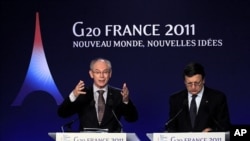The Group of 20 leading economies have agreed to boost the resources of the International Monetary Fund to help curb the European debt crisis.
European Union President Herman Van Rompuy said the decision was reached Friday at the G20 summit in the French resort of Cannes. But the shape of the additional aid for the IMF remained uncertain at a time when some of the world's largest economies, such as the U.S. and China, are facing their own economic difficulties.
The world leaders discussed a variety of options, including setting aside a special IMF fund for assisting debt-ridden European governments.
Greece referendum dropped
Efforts to contain the European governmental debt contagion remained at the forefront of the G20 discussions, even after Greek Prime Minister George Papandreou on Thursday dropped his plan to hold a referendum on the week-old European debt-relief agreement. Under pressure from the U.S. and emerging economies, Italy agreed that the IMF would monitor implementation of its austerity measures aimed at keeping it from needing a bailout.
On the second and final day of their summit, the world leaders also focused on the stabilization of the global economy and efforts to boost domestic consumption in their respective countries.
Rescue package
Thursday's talks were largely overshadowed by Greece's hesitancy to abide by the terms of the financial rescue package agreed to last week by the European Union, under which European banks plan to forgive $140 billion in Greek debt in exchange for the Athens government's agreement to adopt years of austerity measures that are hugely unpopular in Greece.
Late Thursday, French President Nicolas Sarkozy again urged Greece to accept the deal.
"I have admiration for Greece and its people. I have old family ties there, and in no way would I want to give the impression that we are interfering in their domestic affairs," he said. "But on the other hand, this is about the defense of the euro and the defense of Europe - and that's our duty. For us, the red line is very simple. Europe and the euro are our homeland - and that has to be defended."
Earlier this week, Papandreou caused global financial panic by announcing a nation-wide vote on the bailout plan. He backed off his call for the vote after Greek opposition parties finally agreed to back the rescue package.
Sarkozy and German Chancellor Angela Merkel have warned that Greece will not receive "one more cent" of the next $11 billion disbursement of its rescue loan scheduled for December 4 unless it implements the austerity measures.
Without the funds, Greece risks a catastrophic debt default within weeks, putting at risk its membership in the 17-member bloc of nations that use the common European currency.
Some information for this report was provided by AP, AFP and Reuters.













